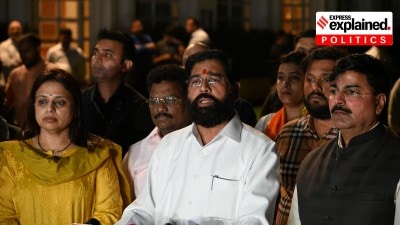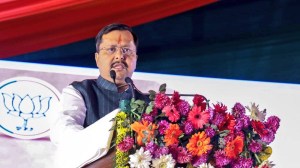Control Shift
FOR someone who8217;s co-directed a movie starring the reigning superstar of Hindi cinema, Sandhya Gokhale is pretty self-effacing. Throug...

FOR someone who8217;s co-directed a movie starring the reigning superstar of Hindi cinema, Sandhya Gokhale is pretty self-effacing.
Throughout the interview, her efforts are as much directed at keeping her profile out of the photographer8217;s frame as in guiding the conversation back to her husband and senior creative associate Amol Palekar.
8216;8216;I am just on a sabbatical,8217;8217; she laughs, brushing off attempts to make her pose. Gokhale is trying to suggest that the transition from being a US-based lawyer, who handled class action suits, to a scriptwriter, who specialises in feminist themes, is temporary. But her more experienced half, will have none of it. 8216;8216;It8217;s an extended and unending sabbatical,8217;8217; comes the emphatic rejoinder from Palekar.
It has coincided with a new phase in his own career, once synonymous with middle cinema. Palekar shed an enduring screen persona as the diffident, Average Guy in the 8217;80s to helm sensitive, small-budget films right up to Anaahat, two years ago. Today, he is yet again breaking the mould with Paheli, a Shah Rukh Khan-Rani Mukerji starrer, that8217;s far removed from his regular brand of intimate cinema.
Bang in the middle of the post-production rush, the couple, who have a permanent residence in Pune, currently live out of a modestly-furnished suburban apartment by the seafront in Mumbai, shuttling between daily editing sessions and promotional events.
So, what gives?
After a mainstream debut, which involved handling half of Bollywood8212;the heavyweight cast includes Amitabh Bachchan, Khan, Suniel Shetty, Mukerji, Anupam Kher, Juhi Chawla and Rajpal Yadav8212;Palekar is still unruffled and unrepentant. 8216;8216;I am certainly not averse to their stardom. In fact, it will help me take the film to a larger audience.8217;8217;
And he can8217;t stop raving about their level of professionalism. 8216;8216;Shah Rukh has the amazing ability to translate every thought into action.8217;8217; Ditto for Bachchan. 8220;He8217;s on the sets on the dot and doesn8217;t even have to refer to the script.8217;8217;
Star presence apart, Palekar admittedly did not allow mainstream methods to interfere with the groundwork he carries out before the camera rolls. From choice of locations to the use of language experts, the script had everything pencilled in before Khan and others came on board. 8216;8216;MM Kreem had already composed the tunes, Gulzarsaab was writing lyrics, and we had identified all the locations,8217;8217; he says.
Vijaydan Detha8217;s Duvidha, a modern retelling of a folk tale, has played on Palekar8217;s mind for a long time now. Sandhya says even the adaptation emerged after 8216;8216;innumerable arguments with Amol, who8217;s quite difficult to please.8217;8217; Indeed, the story of a Rajasthani village girl who8217;s denied any choices evokes a recurring theme in his movies: The right of the woman to choose.
Sandhya, though, has given the plot a new dimension to overcome the 8216;8216;inherent monotone8217;8217; that she found in the story. 8216;8216;It makes a powerful impact, but I thought it was a little incomplete. I could not identify with her. I wanted to take the girl out of her pre-destined life,8217;8217; she adds.
Palekar, too, admits that it is his scriptwriter8217;s search for a contemporary feel which gives the film its multi-layered richness.
Clearly, the blend of the mainstream and the meaningful lies in the chemistry between the couple.
- 01
- 02
- 03
- 04
- 05































